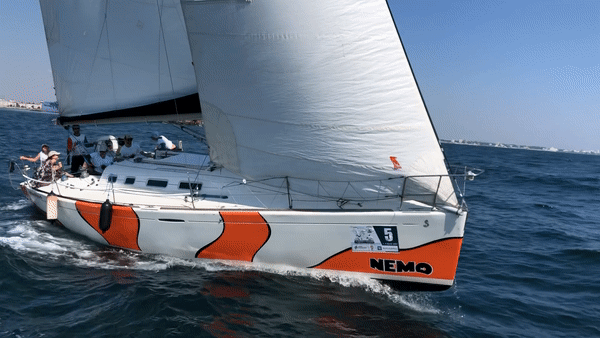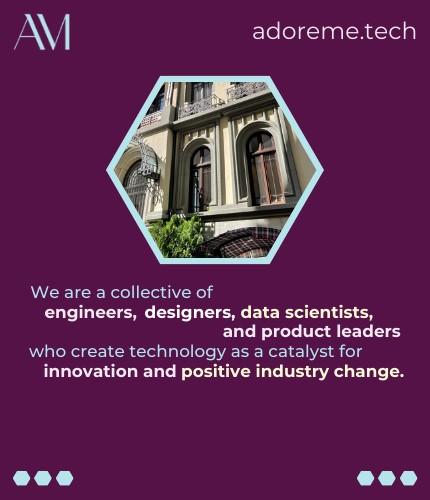Dragos Manescu, Aug 16, 2021

Sailing on the Black Sea
This story is based on a real event and is all about the tremendous force that real, motivated and empowered product teams have to achieve impossible goals. The storyline is mostly about sailing and team collaboration, but it emphasises the applicability in developing products.
The contest was about to begin: 3 boats/ racer-cruisers, 3 teams — most of them beginners — led by 3 skippers and a great sunny day with decent wind.
The second day of the team building was about to start.
This article is not about boats, but about perfect collaboration and how I see product teams. I’ll explain more during the sail.
Crew 1 had the best boat (2+ tones lighter) and the better equipped for a competition — plus one of the members having a little more experience than the others. Crew 2 had a good boat, a little heavier, but all of them were very motivated and competitive — they wanted to win, no matter what. During this retreat, all of them were on a boat for the first time. Crew 3 had the worst boat, but all of them were very motivated to learn more about sailing.
2 minutes left until the start. Everybody was preparing the mainsails and the jibs and were getting ready. On boat 2 there was deep and shallow silence: they were ready. They had made some small mistakes earlier, before getting ready for the race, but now they were ready.
Forming the teams
24 hours earlier everybody was travelling from the hotel to the port yard. No crew was formed and almost nobody had done that before, but everybody was excited and all were looking forward to learning something new.
The teams were randomly formed, the only condition was that the proportion of bigger/smaller persons per boat to be the same, given that some of the tasks in sailing ask for more brute force, while others ask for agility and speed.
Setting up the goals
In Crew 2 most of the members were very competitive and at first glance this might have looked like a recipe for a disaster. And it could have been, but the situation was very specific: nobody knew too much about sailing (all were willing to learn), all of them wanted to win more than taking over as the alpha leader of the ship and everybody was willing to work like crazy to win. There was no reason to have any side goals — it was all for one and one for all despite the competitiveness that the members were feeling through their veins.
It doesn’t mean that in other situations (work related) this team would have found this sweet spot and this common goal, it means that teams in general, in order to work together seamlessly, need to find that goal that everybody believes in and the sweet spot in the relationship between the members that can help them drive the team on the ocean.
Preparing and learning — day 1
The first day was all about learning: components of the boat, manoeuvres, how to do each manoeuvre, terms, the difference between sailing on a lake/river and sailing on the sea.
Too many new concepts and moves, but everybody was happy and during lunch (the only pause of the day), they were all telling stories as if they’ve been sailors for at least 2 decades.
Crew 2 started to collude and create strategies on how they could win the contest from the following day. They were even joking about putting something in the drinks of the other teams during the dinner later that day.
Although these were all jokes, it helped with bounding and forming a common strong belief into their goal: winning. In the end beliefs and dreams drove mankind throughout history.
When building product teams, bonding and creating a strong belief system, together with a strong clear goal will help the team sail through difficult and stressful times.
The race
The silence was as shallow as the sea and everybody could hear in the radio stations the final countdown: 3, 2, 1, race. And it all started.
The race was expected to last about 2 hours and everybody had different expectations about the outcome: crew 1 was sure that they would win (because of their boat and their experience) crew 2 had already set their goal to win (in spite of their boat or experience) and crew 3 was there to learn.
I personally was part of crew 2, so I will share our perspective.
Although our boat was slower and heavier, we had a great start and we landed in first position. We all knew our jobs: the physically stronger were pulling the strings for tacking and/or jibing while the more agile were moving from one side to the other using the grip handle.
There was a person holding the steering and working with the skipper to coordinate us, so that each manoeuvre would be perfectly executed. We needed perfection because our boat was the slower, heavier one.
Everybody was yelling at everybody, but there was no feud or upset, we were just too energetic, too willing to win. There was nothing personal when correcting someone and nobody took anything personal. At some point we even joked about leaving anybody who would fall behind. This sounds so unrealistic given that we were supposed to have fun and enjoy our team building, but we were a competitive team with a clear goal in which we all believed deeply.
Just like any product team should. If you don’t understand your goal, if you don’t know where you are going and if you don’t strongly believe in your objectives, you will definitely fail.
But by having all the above, you can stand a chance even with a slower, heavier boat.
We were in first position for three fourths of the race which is at least 1hr:30, because we executed everything perfectly. Zero mistakes.
Eventually the lighter, better boat took the lead and was able to win the race in the last 10 minutes. Even though we didn’t achieve our goal, nobody was upset, because we saw ourselves as winners: we were leading for 75%-90% of the race with a slower boat and a less experienced crew.
We felt like winners because we did 100% of what we could do, executed everything flawlessly and, deep inside, we knew that we would do even better with a better boat. It was all about focus, trust, motivation, perfect coordination and, in the end, perfect execution.
This doesn’t happen in real life very often, but whenever it happens, it is a gem that teaches you more about situations and teams than any 10 books on management.
The conclusion
As I am making this comparison with empowered product teams, the main takeaways are that:
- This was a critical, stressful situation, not something that you can compare with business as usual.
- The team needs to have a clear, ambitious goal. Something that can make the dream and look for creative solutions to make it happen.
- The team members need to work together, to feel confident with each other and open to continuous communication.
- You need someone to help with the team focus — you usually have the combination product manager (who makes sure that the team works on focused objectives) and the scrum master (who makes sure that the team actually works on those objectives), but anybody would do. We don’t necessarily need to stick to a practice for the sake of the practice.
In the end, I have one big piece of advice for everybody — go sailing with your team, it will teach you and humble you more than most team activities.






























